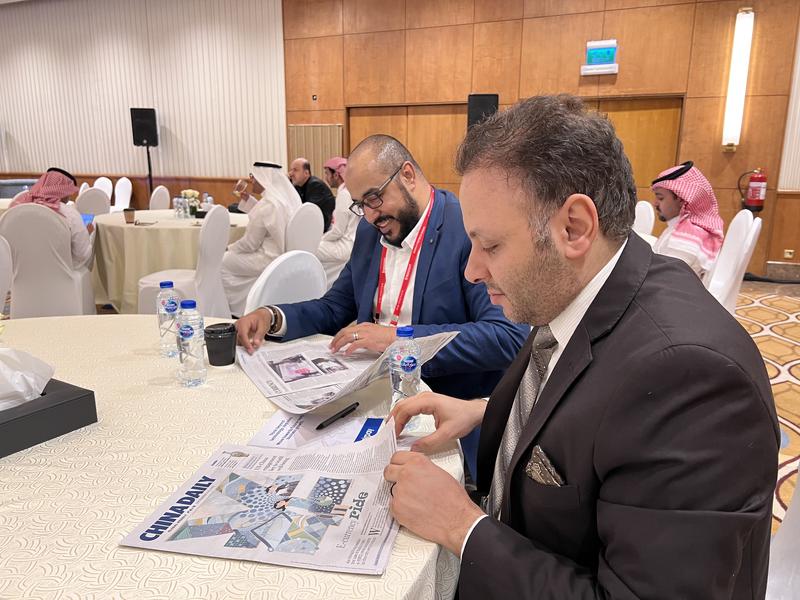 Wasif Hasan, senior director of global trade and supply chain at Al Rajhi Bank, delivers a speech on “Unleashed: Saudi Arabia's Thriving Fintech Ecosystem” at the World Fintech Show in Riyadh, Saudi Arabia, Dec 6, 2022. (YANG HAN / CHINA DAILY)
Wasif Hasan, senior director of global trade and supply chain at Al Rajhi Bank, delivers a speech on “Unleashed: Saudi Arabia's Thriving Fintech Ecosystem” at the World Fintech Show in Riyadh, Saudi Arabia, Dec 6, 2022. (YANG HAN / CHINA DAILY)
RIYADH – It is important to make consumers see the value of open banking to promote open finance in the long run, fintech experts said at a forum in Saudi Arabia on Dec 5.
“The customers have to see the real value,” said Sultan Al-Hamidi, chief business officer of Social Development Bank, or SDB, a Saudi development bank based in Riyadh.
Under the theme “Unleashed: Saudi Arabia's Thriving Fintech Ecosystem”, the World Fintech Show, held from Dec 5 to 6, brought together government authorities, global fintech experts, startups and investors to discuss the fintech ecosystem in Saudi Arabia
In 2019, in partnership with a few other banks, the SDB launched its first savings product for the low-income segment. The product has now attracted around 150,000 customers, drawing in around 300 million Saudi riyals ($79.8 million) in people’s savings.
Sultan was speaking at a panel discussion titled “Open banking today to open finance tomorrow” at the World Fintech Show in Riyadh, which was organized by Riyadh-based Performance Ryada Events Co and managed by global business events and consulting firm Trescon.
ALSO READ: Hong Kong has bright future as a fintech powerhouse
Open banking is the practice that allows third-party financial service providers to have open access to financial data from financial institutions, with the customers’ consent, through the use of application programming interfaces, or APIs.
In November, the Saudi Central Bank issued the Open Banking Framework as one of the key outputs of an open banking program, which is a part of a broader fintech strategy of Saudi Arabia that is linked to the Saudi Vision 2030, a development plan to reduce the nation's dependence on oil.
When it comes to cashless societies, the three core ingredients are technology, regulatory governance and the culture of adoption, said Karl Tlais, founder and strategic adviser at the iAdvisory consultancy in Dubai.
For example, in Asia, during the pandemic, digital wallet platforms such as WeChat Pay and Alipay in China and GrabPay in Southeast Asia, have achieved success, said Tlais, adding that e-wallets are born out of the idea of open banking and it is important to understand how they has kept the economy moving through technology.
ALSO READ: Shenzhen aims to be fintech hub
Noting that the income of Generation Z — people born between 1995 and 2010 — is expected to reach $33 trillion by 2030, Tlais said more innovative integration and a higher level of personalization are needed for banking services.
Aamir Janjua, chief product officer at Spire Tech, an open banking provider in the Gulf Cooperation Council region, said what matters the most in open banking is the value that can be delivered to the consumers.
“At the end of the day, consumers do not really care what kind of technology is used as long as they get options and value,” said Aamir, adding it is also necessary to simplify the open banking process and make the ecosystem more mature and secure to connect different parties.
ALSO READ: Fintech, credit info sharing to boost small biz
Under the theme “Unleashed: Saudi Arabia's Thriving Fintech Ecosystem”, the World Fintech Show, held from Dec 5 to 6, brought together government authorities, global fintech experts, startups and investors to discuss the fintech ecosystem in Saudi Arabia.
During the event, fintech venture builder Fintactics announced the launch of its new ventures Holoul and Leza’am, and also signed a memorandum of understanding with fintech companies Aion Digital and Bitfy Holdings.
 Two participants read the China Daily newspaper at the World Fintech Show in Riyadh, Saudi Arabia, Dec 6, 2022. (YANG HAN / CHINA DAILY)
Two participants read the China Daily newspaper at the World Fintech Show in Riyadh, Saudi Arabia, Dec 6, 2022. (YANG HAN / CHINA DAILY)
Saudi Vision 2030
The national development strategy Saudi Vision 2030 will create huge opportunities for the financial sector, said Wasif Hasan, senior director of global trade and supply chain at Al Rajhi Bank, one of the world's largest Islamic banks by capital.
He made a presentation themed “Unleashed: Saudi Arabia's Thriving Fintech Ecosystem” at the World Fintech Show.
Noting the country is undergoing massive transformation through the strategy launched in 2016, he said the opening of economy, modernization and the growing local talent pool has made Saudi Arabia as an emerging fintech hub, with more than 150 fintech startups.
“The digital financial transactions are expected to grow by 70 percent by 2025,” said he said, noting, as a result of the growing fintech, it is going to contribute to $3.5 billion to the GDP by 2030 and over 18,000 new jobs.
Contact the writer at kelly@chinadailyapac.com


